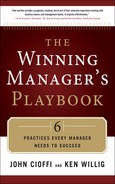The Value of This Chapter
What Most Managers Do
Most managers learn on the job and receive little or no training. Their behavioral “model” is oftentimes themselves, and they tend to fall into two major groups.
The first group is composed of “do it my way” managers—they tell their employees to do things the way they did them. After all, that’s what got them the promotion to manager, isn’t it? As a result, their management style often is focused on process, rather than outcomes. That is, the managers want their employees to conduct activities in the same way that they did. Unfortunately, this requires constant oversight by the manager, with expectations of close adherence to numerous rules.
Conversely, the second group of managers are those who tend to be relatively introverted or merely “hands off” in their style. They like being left alone, so they leave the employees to their own devices as well. This, of course, leaves the employees confused. They come to work each day guessing about what they should do to be successful, and they receive little or no feedback about their performance or their value to the company.
What Winning Managers Do
Winning managers know that every employee is different, but they also know that most people want goals to achieve, so that they know what success looks like. These managers take great care to define the goals and boundaries for each employee, and to ensure that they have the tools and conditions that will allow them to achieve those goals. Then, they work with each employee to help them achieve success—the attainment of their goals.
Consequently, these winning managers empower the employees to attain the goals in their own, and perhaps even unique, way. As long as the employees achieve the goals, without going out of bounds, they will be successful. And that gives a lot more freedom and flexibility to the manager as well.
So here was an example of a manager who was involved in every detail of the business. No one did anything of substance, or made any decisions, without this CEO’s approval. And, of course, the business couldn’t operate without this person’s presence. Vacations and indeed absences of any kind were out of the question for this manager, who was compelled to be present at all times to run the show.
There is quite a contrast between these two CEOs, isn’t there? One is a micro-manager, reveling in the importance of making numerous day-today decisions, while training the staff to seek constant approval. The other is a manager who learned how to empower his team to accomplish his vision, without his constant presence. This frees him from the day-to-day demands and allows him to work on his business rather than in his business—or to take a vacation.
